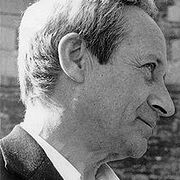Leon Poliakov (1910–1997)
Auteur van Histoire de l'antisémitisme : tome I : L'âge de la foi
Over de Auteur
Leon Poliakov (1910-97) wrote extensively on the Holocaust and anti-Semitism. He helped establish the Centre de Documentation Juive in 1943
Reeksen
Werken van Leon Poliakov
De arische mythe : over de bronnen van het racisme en de verschillende vormen van nationalisme (1971) 87 exemplaren
Geschichte des Antisemitismus II. Das Zeitalter der Verteufelung und des Ghettos (1978) 5 exemplaren
Geschichte des Antisemitismus. Band 5. Die Aufklärung und ihre judenfeindliche Tendenz. (1983) 5 exemplaren
Geschichte des Antisemitismus 4 : Die Marranen im Schatten der Inquisition. Mit einem Anhang: Die Morisken und ihre… (1981) 4 exemplaren
Geschichte des Antisemtismus III. Religiöse und soziale Toleranz unter dem Islam (1979) 4 exemplaren
Geschichte des Antisemitismus, Band 7: Zwischen Assimilation und "Jüdischer Weltverschwörung"; (1988) 3 exemplaren
Moscou, troisième Rome : Les intermittences de la mémoire historique (La Force des idées) (1989) 2 exemplaren
Gli Ebrei sotto l'occupazione italiana 1 exemplaar
1989 1 exemplaar
St. Petersburg - Berlin - Paris: Memoiren eines Davongekommenen (Critica Diabolis) (2019) 1 exemplaar
The Historey of Anti-Semitism vol II 1 exemplaar
La Condition des Juifs en France 1 exemplaar
L'Etoile Jaune 1 exemplaar
Hommes et bêtes, entretiens sur le racisme, actes du colloque tenu du 12 au 15 mai 1973 au centre culturel… 1 exemplaar
La emancipación y la reacción racista 1 exemplaar
Dossier Eichmann 1 exemplaar
Du Christ aux Juifs de cour... 1 exemplaar
Les Samaritains suivi d'une étude de Gilles Firmin "A propos du Pentateuque samaritain" (1991) 1 exemplaar
MITI ARIAN 1 exemplaar
Historia do anti-semitismo 1 exemplaar
Harvest of Hate (Pg. 224-end) 1 exemplaar
Harvest of Hate (Pg. 186-223) 1 exemplaar
Harvest of Hate (Pg. 1-185) 1 exemplaar
Gerelateerde werken
Tagged
Algemene kennis
- Gangbare naam
- Poliakov, Léon
- Officiële naam
- Poliakov, Léon
- Overlijdensdatum
- 1997-12-08
- Geslacht
- male
- Nationaliteit
- France
- Geboorteplaats
- St. Petersburg, Russia
- Plaats van overlijden
- Paris, France
- Woonplaatsen
- Paris, France
- Opleiding
- Faculte de Droit
- Beroepen
- historian
resistance fighter
research historian
memoirist - Relaties
- Wulf, Joseph (co-author)
- Organisaties
- Centre national de la recherche scientifique
Ecole Pratique des Hautes Etudes - Korte biografie
- Léon Poliakov was born to a Jewish family in Saint Petersburg, Russia. His father Wladimir Poliakov owned a publishing house and named his son in homage to Leo Tolstoy. Following the Bolshevik Revolution, the family fled to France, settling in Paris.
There his father founded a new publishing house and in 1933 created the daily newspaper Pariser Tageblatt, targeted to exiled German readers. As a teenager, Léon lived for a few years in Italy and Germany, where he witnessed the rise of Nazism. He then returned to Paris, studied law and literature at university, and wrote for the paper until 1939. At the start of World War II, he enlisted with the French army. Taken prisoner with his battalion by the Germans, he escaped and joined the resistance. In 1943, he helped establish the Centre de Documentation Juive Contemporaine or CDJC (Center for Contemporary Jewish Documentation), dedicated to collecting documentary evidence of the Holocaust. He assisted Edgar Faure at the Nuremberg Trial and brought back from Nuremberg, with his colleague Joseph Billig, numerous documents that became part of the CDJC collection. Under the aegis of the CDJC, Poliakov published his first books, La Condition des Juifs sous l'occupation italienne (The Condition of the Jews under the Italian Occupation, 1946) and L’Étoile jaune (The Yellow Star, 1949). In 1947, he married his wife, Germaine, with whom he had a son. Poliakov served as director of research at the Centre national de la recherche scientifique or CNRS (French National Center for Scientific Research) from 1954 to 1971 and was on the faculty of the Ecole Pratique des Hautes Etudes. He was the first scholar to question the attitude of Pope Pius XII and the Vatican on the Holocaust; in 1950, he published "The Vatican and the 'Jewish Question' -- The Record of the Hitler Period -- and After" in the Commentary. Poliakov's groundbreaking 1951 book Breviaire de la haine (Harvest of Hate) was the first major work on the Nazi genocide. He co-authored a trilogy of major books with German-born historian Joseph Wulf: Das Dritte Reich und die Juden (The Third Reich and the Jews, 1955),
Das Dritte Reich und seine Diener (The Third Reich and its Servants, 1956), and Das Dritte Reich und seine Denker (The Third Reich and its Thinkers, 1959). In 1971, he published Le Mythe aryen (The Aryan Myth: A History of Racist and Nationalist Ideas in Europe). Poliakov was also a pioneer in the fight against revisionists and Holocaust deniers. He published his memoirs L'auberge des musiciens in 1981.
Leden
Besprekingen
Prijzen
Misschien vindt je deze ook leuk
Gerelateerde auteurs
Statistieken
- Werken
- 60
- Ook door
- 1
- Leden
- 656
- Populariteit
- #38,461
- Waardering
- 4.1
- Besprekingen
- 11
- ISBNs
- 120
- Talen
- 7















